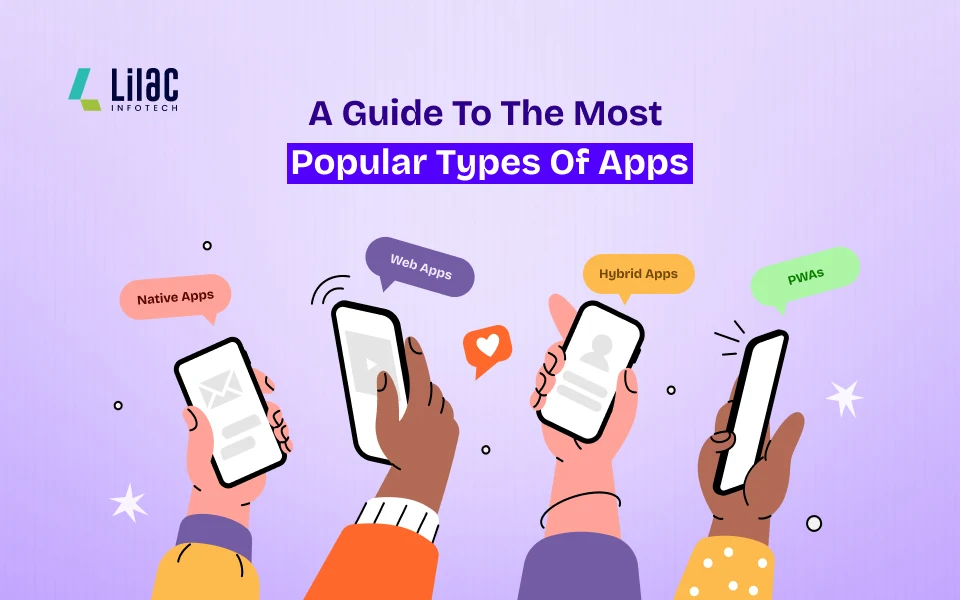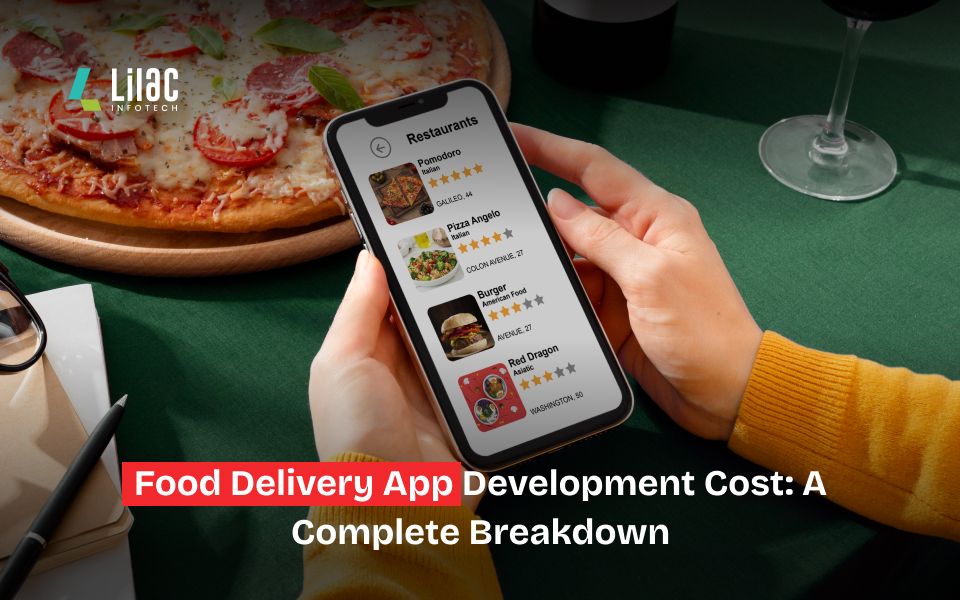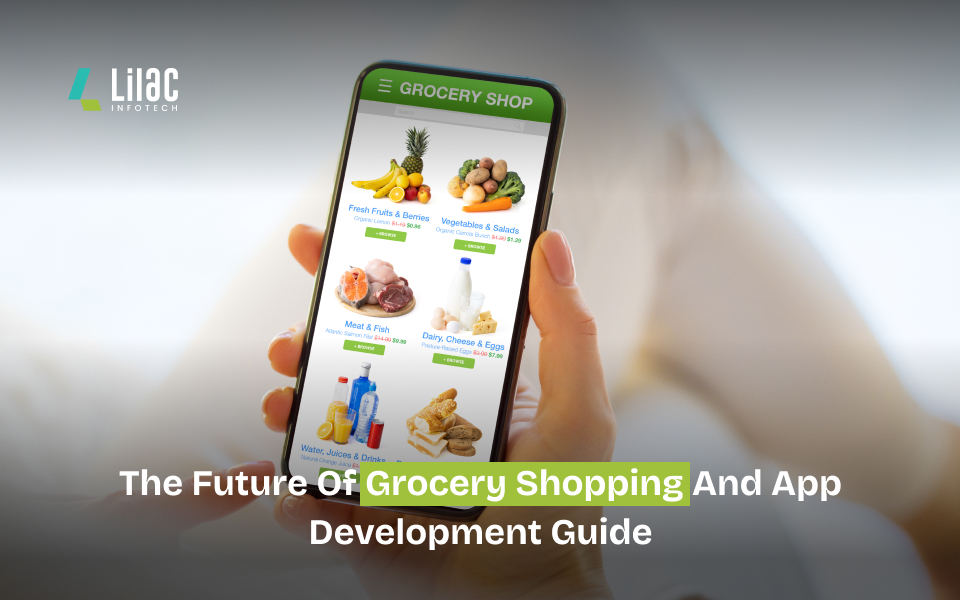
In today’s fast-paced digital era, every process has become more efficient with just a few clicks. For businesses aiming to succeed online, having a dedicated app is no longer optional . It's essential.
From a common user’s perspective, apps can be of different types based on functionality, category, use cases, and more. However, from a developer’s perspective, apps generally fall into four main categories. In this article, we’ll explore these types of apps in detail and help you identify which one is the best fit for your business.
Different Types of Apps
The main types of apps are:
- Native Apps
- Web Apps
- Hybrid Apps
- Progressive Web Apps (PWAs)
Let’s dive deeper into each types of app:
1. Native Apps
Native apps are specifically designed for mobile devices and are built to work with a particular mobile operating system. This means they are developed separately for Android and iOS .
Pros
- It is optimized for a specific platform, which allows it to deliver high performance.
- Apps take full advantage of device features, including both hardware and software..
- These apps are known for their user-friendly design and flexibility.
- Many native apps can work offline. That means it works without an internet connection.
Cons
- Longer Development Time
- Cost of development also may high based on requirement of app
Native apps are ideal for businesses that require high performance, advanced functionality, and a superior user experience. It’s best to consult a mobile app development company or consultant to identify and structure the requirements that best suit your business.
2. Web Apps
Web applications, or web apps, run on web browsers and can be accessed without installation. Compared with other types of apps, web apps are independent, meaning they can be used across devices such as desktops, tablets, and smartphones. This flexibility makes them highly cost-effective, reduces development time, and makes them easy to maintain.
For business purposes, web apps provide the advantage of instant updates, simplified data management, and greater scalability. They enhance customer engagement by offering user-friendly interfaces and responsive designs that adapt to any screen size.
Pros
- Can be accessed on different devices without installation.
- Development and cost and time are low compared to native apps.
- Maintenance is simpler than with other types of apps.
- Responsive design enhances user experience across all devices.
Cons
- Requires an internet connection to access the app.
- Security concerns – more vulnerable to cyber attacks if not properly secured.
- May be slower than native apps for resource-intensive tasks.
Hybrid Apps
Hybrid apps are a combination of both web and native apps. Popular examples of hybrid apps include Gmail and Instagram. Built using web technologies like HTML, CSS, and JavaScript, hybrid apps are wrapped in a native container, allowing them to run on both Android and iOS devices without the need for separate codebases.
Hybrid apps also offer faster deployment, easier updates, and the ability to reach a wider audience quickly. By choosing hybrid app development, companies can optimize resources while delivering a consistent user experience across different devices and operating systems.
Pros
- Hybrid apps work on both Android and iOS, so there is no need to create separate applications for each platform.
- Development is cost-effective compared to native apps.
- Developers don’t need to worry about lengthy approval processes for each app store, as deployment and updates can be done easily.
- Businesses can reach a larger audience with a single app across multiple platforms.
Cons
- Accessing device hardware features sometimes requires third-party plugins, which may not always be reliable.
- Hybrid apps may not be as fast or smooth as fully native apps, especially for graphics-intensive tasks.
- Some hybrid apps depend heavily on internet connectivity to function properly.
Progressive Web Apps (PWAs)
Progressive Web Apps (PWAs) are trending modern web applications that combine the best features of both web and mobile apps to deliver a smooth digital experience. They are designed to work across all platforms using a single codebase, making them highly cost-effective for businesses.
PWAs do not require downloads from app stores; users can access them directly through a browser and even install them on their home screens for quick access.
Pros:
- No app store requirement; users can access the app directly through a browser.
- PWAs work on any device, ensuring cross-platform compatibility.
- Maintaining a single codebase for all platforms reduces development and maintenance costs.
- Faster loading times and improved performance enhance user experience.
- PWAs can work offline or in low-network conditions.
Cons:
- PWAs cannot fully access certain device features, such as advanced camera functions or Bluetooth, on some platforms.
- Unlike native apps, PWAs are not listed in app stores, which can reduce organic visibility.
Still confused about which option is best for your business? It is best to consult an expert. You can reach out to a software agency or a mobile application development company to get the right guidance and excel in your digital transformation journey.
Lilac Infotech is an internationally recognized company and one of the leading software development companies in Kerala. Feel free to contact us to get expert guidance on the services we offer.
FAQ
1. Does my business need a native, hybrid, or PWA app?
To decide this, we first need to understand your business needs. Native apps offer better functionality and performance, hybrid apps save development time and cost, and PWAs provide cross-platform accessibility with offline support.
2. How long does it generally take to develop a mobile app?
Apps with fewer features or simple apps may take 1–2 months, while complex apps can take 6–8 months. The timeline depends on the app’s complexity, features, and the platform for which it is being developed.
3. How much does it cost to develop a mobile app for my online business startup?
App development costs vary based on features, design, platform, and development team location
4. Do developers provide post-launch support and maintenance for mobile apps?
Yes. Authorized app development companies offer ongoing support, maintenance, and updates to ensure your app continues to perform optimally.



















Post a Comment